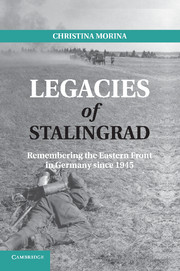Epilogue
1989 and Beyond
Published online by Cambridge University Press: 07 October 2011
Summary
The Cold War, which was marked by burdens, psychoses, and apocalyptic expectations, is no longer part of our lives…. Today, the division of Europe has ended and a final line has been drawn under the Second World War.
Eduard Shevardnadze, September 29, 1990In the so-called Berlin republic, the role of German history and particularly the history of National Socialism was and is omnipresent in the search for a unified national identity and in the formation of a new political culture, including a new foreign policy paradigm. Moreover, since the end of the Cold War, historical thinking and collective forms of remembering the past have become centerpieces of political discourse on the national and international stage around the world. Memory, particularly memory of collective trauma, with the Holocaust constituting a universal point of reference in most discourses commemorating extreme violence, has become a global and globalized phenomenon. Although my focus here has been on preunification Germany, I shall now provide a brief overview of the contours of political memory of the Eastern Front in reunified Germany; I can thus offer no more than a first, tentative analysis and will seek to raise questions for further research. First follows a summary of the way the Eastern Front war played out in German domestic and foreign policy debates in the two decades since 1989, with a focus on the negotiation of German reunification and the fiftieth (1991) and sixtieth (2001) anniversaries of the invasion of the Soviet Union. I then conclude with an examination of one of the most important postunification historical debates in Germany – the controversy over the so-called Wehrmacht exhibit in the mid-1990s – and its implications for elite political discourse and popular memories of the Eastern Front in Germany in the second decade of the twenty-first century.
- Type
- Chapter
- Information
- Legacies of StalingradRemembering the Eastern Front in Germany since 1945, pp. 231 - 261Publisher: Cambridge University PressPrint publication year: 2011



